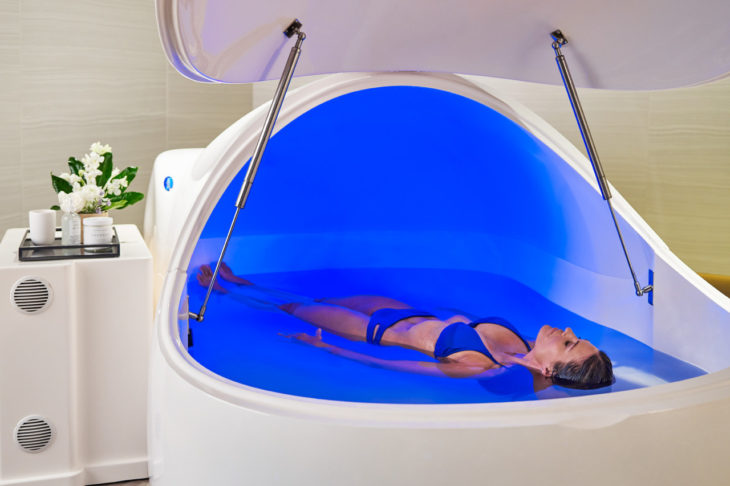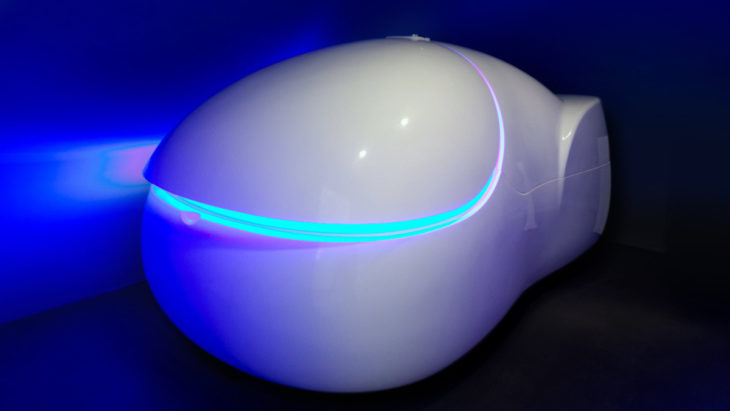The only reference I’ve ever really seen to sensory deprivation tanks was on “The Simpsons,” when Lisa and Homer use deprivation tanks and Lisa learns how to empathize with her dad after also tuning into the existence of her cat, a tree, and Cokie Roberts. Ever since then I’ve been curious in a sort of back-of-my-mind, I’ll-get-around-to-it-someday sort of way about what the experience is like. Do you really hallucinate? Do you have out-of-body experiences? Is it really relaxing to just, like, float for an hour?
Unlike some of the other new things I’ve tried this month, I don’t really have a big back story to deprivation tanks: It’s a purely new thing for me that, before trying it, I didn’t have a whole lot of background or opinions on. It was pure curiosity that drove me to Chicago’s SpaceTime Tanks for an hour-long floating session. When I got there, it became clear that they really, really try to create a totally stress-free atmosphere, between the soft music playing, an aquarium, a not too overwhelming scent of diffused oil, free tea, and the employees, who speak at an almost-whisper.
When I was escorted to the tank room, one of the employees near-whispered instructions for what to do and what to expect for a few minutes (I’m not making fun of the near-whisper, by the way; it was sort of funny but also really pleasant not to be bombarded with sound for once in a city of almost 3 million people). You shower, you get in, you get comfortable, you float for an hour, and when your hour is done an employee comes and knocks on the door (softly, of course), and then comes in and knocks (softly) on the tank. You knock back, they leave the room, you shower again, and hey presto, you’ve been sensorially deprived for an hour!

Source: wsj
The tank is 8 feet long and 4 ½ feet wide, filled with 10 inches of water and 900 pounds of epsom salts, so unless you weigh more than the combined weight of the water and epsom salts, you will indeed float. You can also expect for it to hurt for a second, because you probably have, like, hangnails and paper cuts, but it goes away. They provide earplugs so that you can luxuriate your head back without getting salt all up in your ears, although that’s not bad for you (it just means you’ll be picking salt crystals out of your ears when it dries). Epsom salts are good for your skin, too, and apparently just fine for hair, as well. At SpaceTime, they provide Whole Foods 365-brand shampoo, conditioner, and shower gel, so I walked away smelling like mint and lavender, and I can’t complain about that.
So: Do you hallucinate? Do you have out-of-body experiences? The employees are very clear about telling you that they can’t tell you what to expect, actually, because it’s different for everyone. They say that the experience goes better if you have a goal in mind, whether that’s stress relief, un-blocking creatively, pain relief, tension release, working on a project, and so forth. They also say that if you fall asleep, it’s probably because you needed to sleep, so that’s not a wasted session.
I chose to go in with the goal of figuring out how to approach a book I’m writing more cohesively. Once I was in, I did take a few minutes to sort of follow the floaters in my vision, which was fun, and I did hallucinate a bird – a few times over the session, actually. Once I hunkered down and put my mind to the book, I found it extremely productive. One of the things I do to figure out how to write fiction is to type out conversations with my own brain to see what’s causing creative stumbling blocks, but I’m usually too sensorially distracted to do it free-flow in my head. Without those distractions, I was able to train my brain toward the questions: What do I want to accomplish with this book? How do I want to accomplish it? When do I do my best writing? What do I believe? What are my biggest emotional obstacles with writing right now?
In case it’s of interest, I came up with this, without going into horrific amounts of detail: I do my best writing and talking when I’m really, excruciatingly, enthusiastically passionate about the topic. I want to explore art as a language, a way of communicating. I am deeply interested in how time relates to communication (through a series of other things, like time, the human experience of time, and how we relate that experience to other communicative beings, for example). I don’t know exactly what I believe, because I have a lot of background on things I don’t believe and not much background on things I think I do. And my biggest emotional obstacles are some open-ended questions I have in relationships with other people that I would like answered, and a lack of confidence in what I want and need that has led other relationships to become confused and badly-communicated.

Source: lifehacker
All of that in an hour!
I walked away from sensory deprivation feeling somewhat more relaxed, mostly, I think, because I challenged myself to get in touch with people who I need to talk to, I resolved some questions I was letting linger in the back of my head about my relationships, I freed up some stubborn but not entirely well-founded opinions about what I’m capable of doing, and I resolved to remove things from my life that were distracting me from those excruciating passions. I tied up loose ends, and now I don’t have to think about them anymore. It’s a good feeling.
We get so few opportunities for our brains to just be. I know, personally, that I often feel completely and totally overwhelmed by the mass of humanity that I live in, and by the pressures of job-home-family-partner-greater ambitions, and that we’re all just bombarded with stimuli that can distract us from the things we care about, or even just from taking care of ourselves. It seems worth it to shell out a few bucks, every once in a while, to not take in so much.
Original by: Rebecca Vipond Brink
